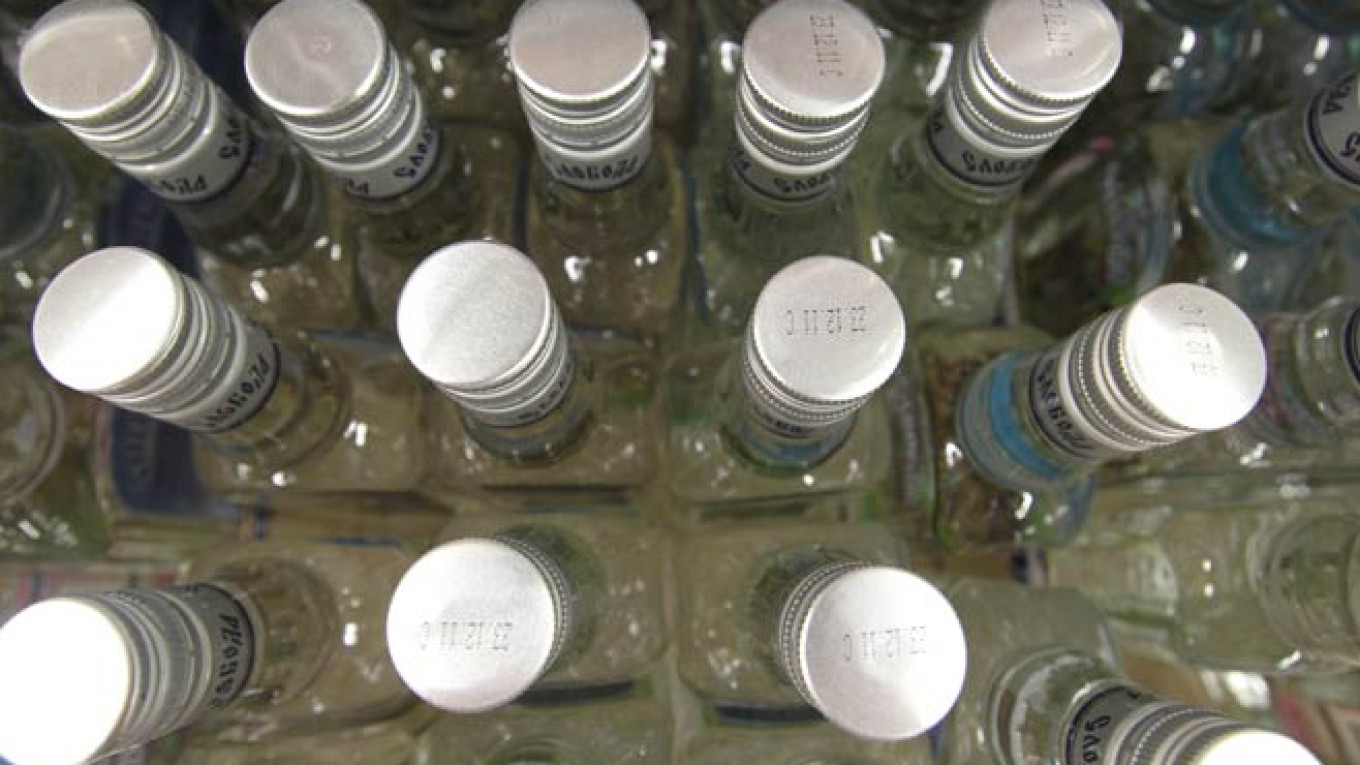As the rising price of vodka drives Russian consumers toward illegal products and Kazakh imports to quench their thirst, the government may halt further tax hikes that were intended to combat endemic alcoholism.
Prime Minister Dmitry Medvedev has ordered the Finance Ministry to explore the issue of freezing or even lowering the excise tax on spirits with an alcohol content of over 9 percent, Interfax reported.
"This decision would require tax losses; it would be very painful for us," Deputy Finance Minister Sergei Shatalov told RBC, adding that the pace of tax increases could be slowed all the same.
The national alcohol excise task rose 33 percent in 2013, the largest increase in modern Russian history, and a further 25 percent this year, pushing the lowest retail price for a half-liter bottle of vodka up to about 250 rubles ($7). The minimum legal resale price also climbed to 199 rubles ($5.50) in 2014 from 125 rubles ($3.50) in 2012.
Under the existing tax plan, the excise duty should rise a further 20 percent in 2015 and 10 percent in 2016. By 2017 the increase will slow to 4.5 percent, or about the level of inflation.
Making alcohol less affordable was an explicit element of the Russian government's plan to lower citizens' alcohol consumption, according to a convention signed by President Vladimir Putin in 2010.
At that time the government pledged to cut Russians' alcohol intake by 15 percent by 2012 and 55 percent by 2020 while "liquidating" the market of illegal alcohol.
Vodka has indeed become more expensive, but the measures have had an unintended side effect.
"By my estimate, more than a third of consumers are unable to buy vodka at this price. This means that they are generating a demand for illegal products," Dmitry Dobrov, chairman of the Union of Alcohol Producers, told RBC.
Illegal vodka accounted for? 55 percent of? the entire vodka market in? 2013, Igor Kosarev, vice president of? distiller Russky Standart, told Kommersant.
Just as illegal vodka is pouring into the market, so are imports from Kazakhstan, where alcohol is significantly cheaper on account of lower excise duties, Dobrov said.
Kazakhstan doubled its excise tax this year, but the current rate of 38.8 rubles per half-liter bottle ($1.08) is still three times lower than Russia's tax.
In 2012, the Finance Ministries of Russia, Kazakhstan and Belarus — the three countries of the Russia-led Customs Union — agreed to synchronize their excise taxes on alcohol and cigarettes, Shatalov said.
"Unfortunately, these agreements were not put down in any documents. We did not manage to sign an intergovernmental agreement, and Kazakhstan has taken a rather tough stance," he said.
Total legal vodka production in Russia fell 12 percent in 2013, according to the Federal State Statistics Service, and is still plummeting. From January to March this year, legal Russian enterprises produced 10.8 million decaliters of vodka, 17 percent less than in the same period last year.
Contact the author at d.damora@imedia.ru
A Message from The Moscow Times:
Dear readers,
We are facing unprecedented challenges. Russia's Prosecutor General's Office has designated The Moscow Times as an "undesirable" organization, criminalizing our work and putting our staff at risk of prosecution. This follows our earlier unjust labeling as a "foreign agent."
These actions are direct attempts to silence independent journalism in Russia. The authorities claim our work "discredits the decisions of the Russian leadership." We see things differently: we strive to provide accurate, unbiased reporting on Russia.
We, the journalists of The Moscow Times, refuse to be silenced. But to continue our work, we need your help.
Your support, no matter how small, makes a world of difference. If you can, please support us monthly starting from just $2. It's quick to set up, and every contribution makes a significant impact.
By supporting The Moscow Times, you're defending open, independent journalism in the face of repression. Thank you for standing with us.
Remind me later.


